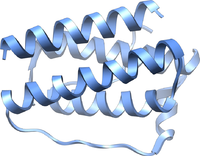
Photo from wikipedia
AIMS Although the benefits of exercise can be potentiated by fasting in healthy subjects, few studies evaluated the effects of this intervention on the metabolism of obese subjects. This study… Click to show full abstract
AIMS Although the benefits of exercise can be potentiated by fasting in healthy subjects, few studies evaluated the effects of this intervention on the metabolism of obese subjects. This study investigated the immediate effects of a single moderate-intensity exercise bout performed in fast or fed states on the metabolism of gastrocnemius and soleus of lean and obese rats. MAIN METHODS Male rats received a high-fat diet (HFD) for twelve weeks to induce obesity or were fed standard diet (SD). After this period, the animals were subdivided in groups: fed and rest (FER), fed and exercise (30 min treadmill, FEE), 8 h fasted and rest (FAR) and fasted and exercise (FAE). Muscle samples were used to investigate the oxidative capacity and gene expression of AMPK, PGC1α, SIRT1, HSF1 and HSP70. KEY FINDINGS In relation to lean animals, obese animals' gastrocnemius glycogen decreased 60 %, triglycerides increased 31 %; glucose and alanine oxidation decreased 26 % and 38 %, respectively; in soleus, triglycerides reduced 46 % and glucose oxidation decreased 37 %. Exercise and fasting induced different effects in glycolytic and oxidative muscles of obese rats. In soleus, fasting exercise spared glycogen and increased palmitate oxidation, while in gastrocnemius, glucose oxidation increased. In obese animals' gastrocnemius, AMPK expression decreased 29 % and SIRT1 increased 28 % in relation to lean. The AMPK response was more sensitive to exercise and fasting in lean than obese rats. SIGNIFICANCE Exercise and fasting induced different effects on the metabolism of glycolytic and oxidative muscles of obese rats that can promote health benefits in these animals.
Journal Title: Life sciences
Year Published: 2023
Link to full text (if available)
Share on Social Media: Sign Up to like & get
recommendations!